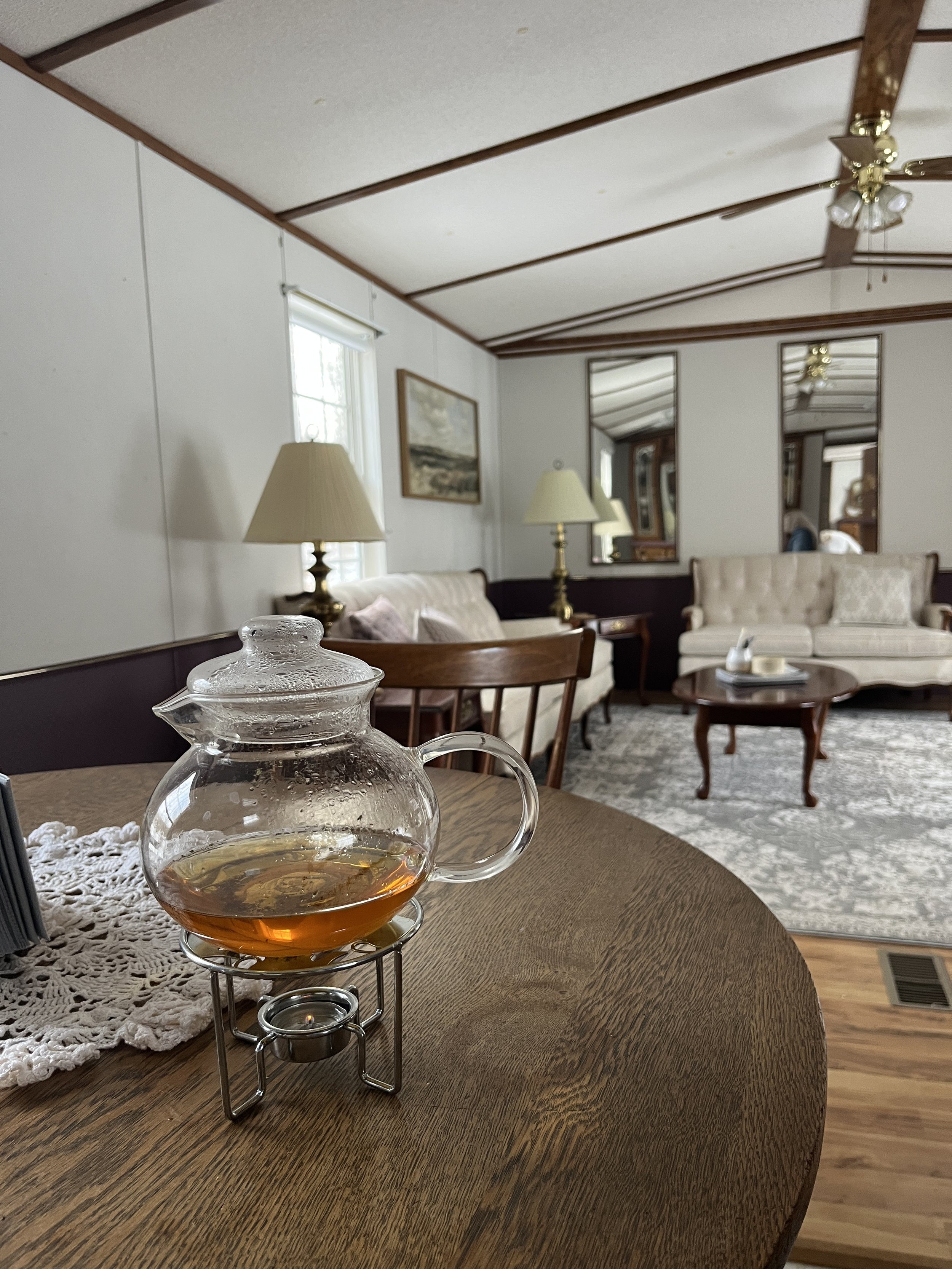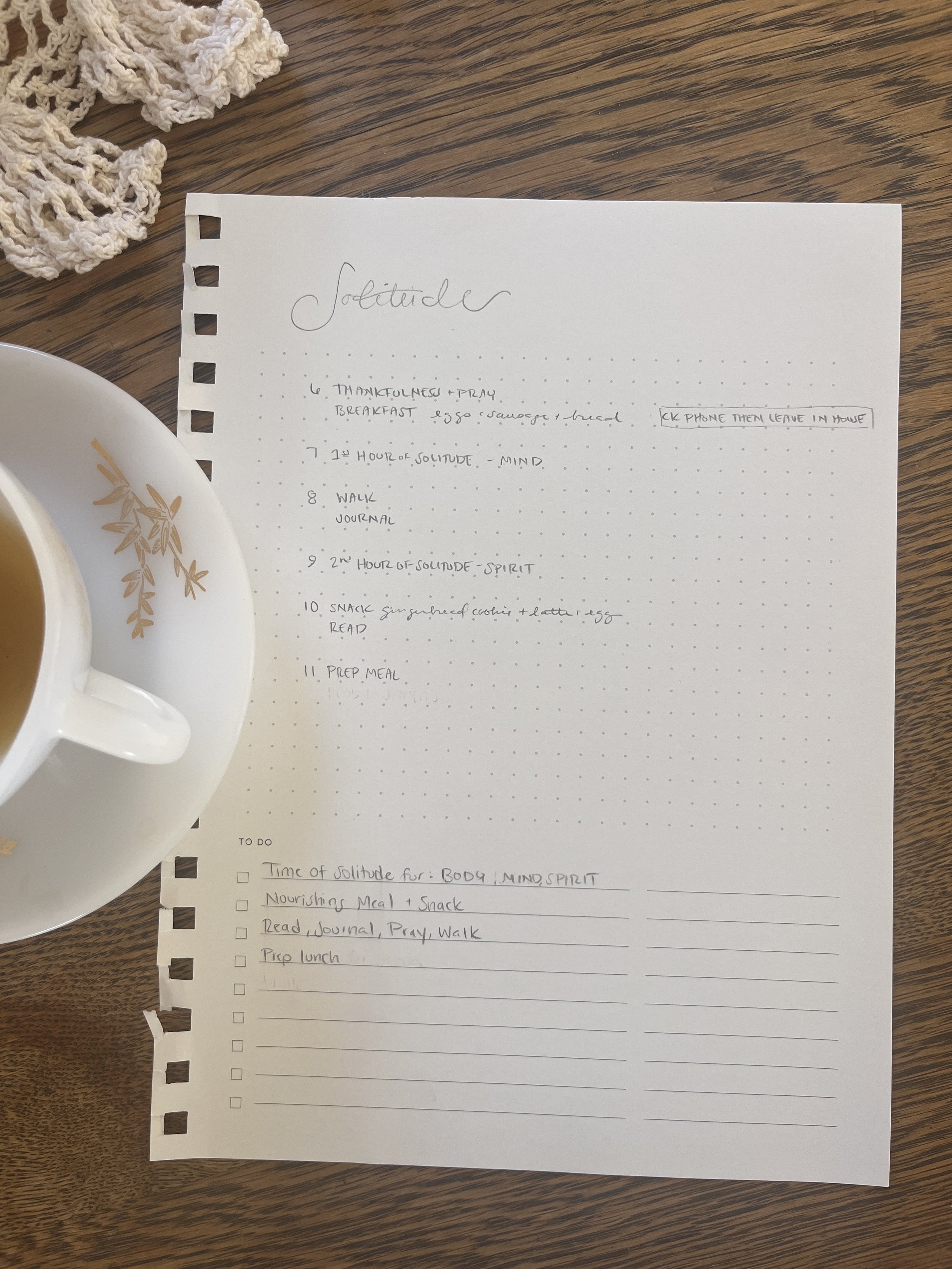“All the unhappiness of men arises from one single fact, that they cannot stay quietly in their own room.”
I have not been so moved to change by a concept since I read John Mark Comer’s The Ruthless Elimination of Hurry, which led me to set my phone down and un-busy my mind and life. My bible study group has been working through Comer’s “Rule of Life” — practices representing the “way of Jesus” and the habits he displayed in His earthly life. We began with Fasting: a four-week study that brought new perspective on this old practice, then moved on to Solitude and then to Generosity. There are a handful we have not got into yet, including Sabbath, Prayer, Scripture, Community, Service, and more being added. All of them have been transformational but I have not been able to move past Solitude.
The first week came with a simple practice of spending five minutes in complete silence in a place of solitude (where no one else is in sight). It was encouraged not to spend the time in prayer or reading the bible as to busy the mind but to simply sit and “be with God.” It was surprisingly hard. My mind roamed to the ticking seconds passing, wondering if this was a productive use of my time. Was I supposed to be hearing from God, or feeling a special feeling? I didn’t.
In the following weeks, we learned that our need for silence and solitude arises from our inability to give up control and rest in God. That it is needed to empty ourselves of our worries and distractions and as we practice it we will learn to find the place of rest for our souls and encounter God. Comer’s four-week study started with finding: 1. The Quiet Place, 2. Encounter with Ourselves—where we empty ourselves of our distractions and constant outer or inner need for chatter and productivity, 3. Encounter with our Enemy where we face the things that threaten to happen if we give up our need for distraction and control. Then, as we move past them we enter into, 4. Encounter with God.” I picked up the recommended reading by a favorite author of mine, Ruth Haley Barton, called Solitude and Silence, and it was as if every word was spoken to my soul, as needed at this particular time in my life. I was captivated; reading slowly, trying to let the truths sink into me.
“At the heart of man there is an innate silence, for God abides in the innermost part of even person. God is silence, and this divine silence dwells in man. In God, we are inseparably bound up with silence…God carries us, and we live with him at every moment by keeping silent. Nothing will make us discover God better than his silence inscribed in the energy of our being. If we do not cultivate this silence, how can we find God? Man likes to travel, create, make great discoveries. But he remains outside of himself, far from God, who is silently in his soul…There is no place on earth where God is more present than in the human heart. This heart truly is God’s abode, the temple of silence…The Father waits for his children in their own hearts.”
“The invitation to solitude and silence is just that. It is an invitation to enter more deeply into the intimacy of relationship with the One who waits just outside the noise and busyness of our lives. It is an invitation to communication and communion with the One who is always present even when our awareness has been dulled by distraction. It is an invitation to the adventure of spiritual transformation in the deepest places of our being, and adventure that will result in greater freedom and authenticity and surrender to God than we have yet experienced.”
In the age of distraction the inability to remain in solitude and silence for more than a handful of minutes without letting my mind wonder was glaring. I needed to learn this practice.
Daily, during the four week study we challenged ourselves to practice 5-10 minutes of solitude a day. As I pushed past my distractions and anxieties I began to find a place of encounter with God. A familiar place to come to. I am still in the practice of allowing this to become my permanent residence as I continue through my day but I have noticed a leap in my ability to hand worries over to the Lord; to let go and let him.
“The decision (of solitude & silence) is to release the world and your fate, including your reputation and “success,” into the hands of God…For those who do not understand our desperate situation, these disciplines look strange or even harmful. But they are absolutely necessary for those who would find rest for their soul in God and not live the distracted existence (Blaise) Pascal so accurately portrays.”
“Solitude and silence are the most radical of the spiritual disciplines because they most directly attack the sources of human misery and wrongdoing. To be in solitude is to choose to do nothing. For extensive periods of time. All accomplishment is given up. Silence is required to complete solitude, for until we enter quietness, the world still lays hold of us. When we go into solitude and silence we stopped making demands on God. It is enough that God is God and we are his. We learn we have a soul, that God is here, that this world is “my Father’s world.”
At the end of the study, our bible study group planned a Solitude Retreat as recommended by the course, but since we planned it in a cabin in the mountains in December we inevitably had to cancel because of severe weather. I decided to keep my babysitter for one of the days and practice an extended period of Solitude myself. I sat down the night before and jotted down a simple plan so as not to let the normal tasks of the day take over. I planned what time I would wake up, a few nourishing meals, a time to start solitude, a walk in the beautiful snowy air and journalling, another hour of silence, then a time of reading more of Barton’s book and continued like that.
It was wonderful! By lunch I was just starting to make some progress in my time of solitude. I think it was a good start for a beginner but I could tell my soul longed for a longer period. I look forward to making this a regular practice in my spiritual life. Barton talks about times of solitude—along with being a place of encounter with God—also being an avenue of rest for the body, mind, and soul, a time of emptying ourselves, as well as facing ourselves. She found times of solitude to be a mirror for the sin in her life, as well as a healthy reflection on her work as a writer. Times of solitude helped her to see herself as she really was after removing the external voices and movements of the world. I was just entering into this kind of reflection with my short retreat. I am putting it on my calendar to have a day of solitude once a quarter with an extended time once a year.
“Solitude is the furnace of transformation . . . [It] is the place of the great struggle and the great encounter—the struggle against the compulsions of the false self, and the encounter with the loving God who offers himself as the substance of the new self.”
“It is that perilous and priceless journey inward to that place at the center of ourselves where God dwells…The practices are very simple, but don’t be deceived: many of them involve significant paradigm shifts, and we need practice to actually make the shifts. ”
I highly recommend doing the practice by John Mark Comer as well as reading Ruth Haley Barton’s book, Solitude and Silence. If you or a group would like to plan a Solitude Retreat in response, I will include a couple downloads below to give a simple framework for you to use if needed.
*Note for hunters: As I was practicing this in the fall when many people were hunting, I realized that the practice of hunting is a wonderful setting for practicing solitude and silence. Perhaps you’d like to take these prompts along with you in the woods next time you spend a day or weekend hunting.
Downloads:
Solitude Retreat: One Day
Solitude Retreat: One Day (Editable)
Solitude Retreat: Two to Three Days
Solitude Retreat: Two to Three Days (Editable)
Beginning Reading
Prompt One: Rest for the Body
Prompt Two: Rest for the Mind
Prompt Three: Rest for the Soul
Prompt Four: Emptiness
Prompt Five: Facing Ourselves
Prompt Six: Pure Presence
Resources:
Link to Practice with John Mark Comer: Practicing The Way (Solitude)
Link to other practices with John Mark Comer
Book: Invitation to Solitude and Silence, Ruth Haley Barton




